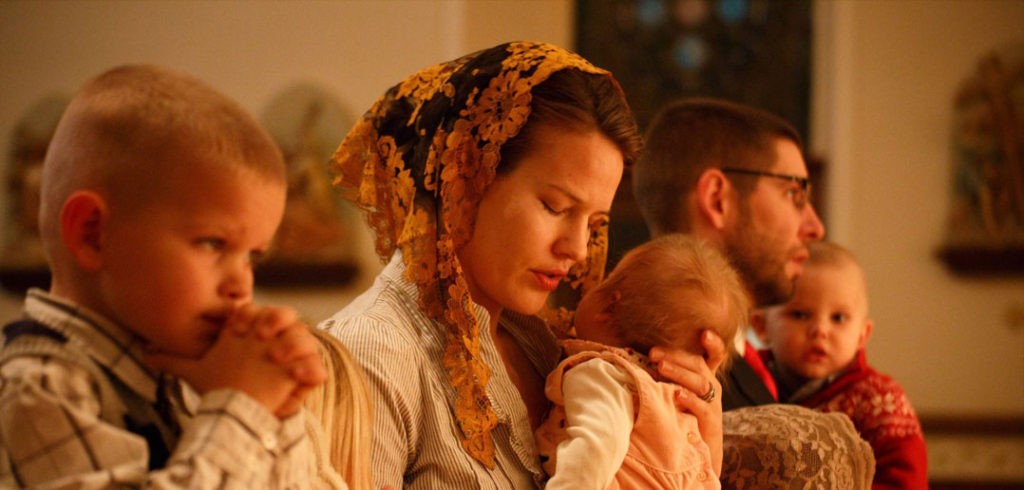By Jonathon Van Maren
It is perhaps somewhat ironic that the last time Americans were informed this incessantly of the threat Russia posed to the United States, it was called the Soviet Union and the Left was insisting that everything was being overblown. This time, in spite of a glaring lack of evidence, it is the Left that is announcing from its perch in the mainstream media that Donald Trump is Vladimir Putin’s puppet, and that Russia is the evil puppet-master pulling the strings of American democracy. The sinister Russian bear is growling in the East, we are told, and we should all be very, very afraid.
Leaving aside for a moment any analysis of Russia’s situation in the geopolitical scheme of things—Peter Hitchens makes a very persuasive case that the ongoing demonization is self-serving—it is interesting to consider what everyday Russians think of the West, and specifically the United States. After my last trip to Eastern Europe a couple of years ago, I wrote a column explaining that many of those in more traditional societies don’t actually see the West as an exporter of freedom. The USA to most nations overseas is Hollywood, trashy pop music, Internet pornography, and the relentless promotion of alternative sexual lifestyles. My tour guide in Serbia, an unemployed engineer we’d hired for the day, complained bitterly about attempts by the Western powers to force Pride Parades in countries like his own.
This suspicion, it seems, is widespread. Last month, Sigal Samuel published a fascinating essay in The Atlantic titled “Where Russia is seen as a buffer against the US.” In it, she describes that Russia and other more traditionalist nations often see the USA as a debauched enemy of faith and tradition. According to a Pew Research Center Survey, “in most nations with Orthodox Christian majorities, Russia is seen as an important buffer against the influence of the West.” America, Samuel notes, is not perceived how many Americans might think they are perceived, and the US is no longer seen as a Christian nation to many.
The survey included fascinating details:
The Pew researchers interviewed more than 25,000 adults in Russia and 17 other countries, from Ukraine and Poland to Bulgaria and Greece. They found that Orthodox Christians make up an estimated 57 percent of those in the region; in Russia, that number rises to 71 percent. The survey also found that the share of the population that identifies as Orthodox has risen dramatically in the region’s largest countries since the fall of the Soviet Union. By contrast, in historically Catholic countries, Catholics have seen declines.
The rise of Orthodox Christianity carries important implications: Those in Orthodox-majority countries are more likely than people elsewhere to be socially conservative, to say they’re very proud of their nationality, to see their culture as superior to others’, and to state that “a strong Russia is necessary to balance the influence of the West,” the survey found. Most people in these nations agreed with that last statement. Even in Greece, 70 percent were on board with it, despite the fact that the country is a member of the European Union.
It is no exaggeration to say that under the Obama Administration, the United States was the bully if not enemy of socially conservative governments. The European Union is also relentless in its attempts to push the LGBT agenda as well as demanding the legalization of abortion in Poland and Ireland. There are many in Eastern European nations who are angered by the arrogance of the West in seeking to impose a new value system, and many in Russia, as well. The Cold War dynamics of a godless Evil Empire and the Christian West are no longer in place—the slow but steady re-Christianization of Russia since the fall of the Berlin Wall is perhaps one of the most underreported stories of the last thirty years. One of the authors of the study noted that, “The look toward Russia is multi-dimensional: It’s geopolitical, it’s cultural, it’s religious, and it’s also economic.” Samuel concurred, adding that, “Russia’s desire to balance the West on all these fronts appears to stem partly from a perceived values gap—a conflict between the ‘traditional values’ in respondent’s countries and the values of the West.”
Many Eastern European nations are also suspicious of American’s no-holds-barred capitalism and the accompanying materialism and radical individualism that has come to define American culture. Many wonder “whether the Western rat race is all that it’s cracked up to be,” Brittany Pheiffer Noble told Samuel. And while the geopolitical and economic tensions are obvious to everyone, the cultural and religious tensions have gone unmentioned by commentators and analysts, if not missed entirely:
But the perception of clashing values goes beyond different economic models. Pheiffer Noble added that there is a widespread sense among Russians that they are safeguarding civilization, be it through the conservative gender norms and sexual norms they advocate, the literature they produce, or the soldiers they send off to war in every generation. “In Russian culture, they have their canon, and their canon is pretty impressive,” she said. “They got Tolstoy and Dostoevsky. They’ve got iconography. They’ve got the idea of suffering as a cultural value—and they feel like they’re winning at that.”
It’s not hard to see why many Russians feel this way. Here in the West, it is rapidly becoming a hate crime to say things like “men can’t get pregnant.” Parents who believe in traditional marriage between a man and a woman are being eyed by the state with suspicion, and laws are being passed that could one day be used by the government to remove children from “homophobic” homes. The transgender craze, with children being fed hormone blockers and promised genital mutilation before the age of discretion, and the publicly funded simulated orgies that take place in our streets during “Pride Month” each year, not to mention a dozen other accepted dogmatic insanities, must surely make it appear to simpler and wiser people as if we’d all gone mad.
That’s not to mention the fact that “suffering as a cultural value” has vanished completely from the West. We understood it once, when the Judeo-Christian values that undergirded our society had not yet been chipped away. But now, potential suffering is the main excuse given for the destruction of human life in the womb, if any excuse is even given at all. Limited euthanasia is giving way to suicide-on-demand, with the fictitious right to have the government fund your self-extinction if you do not wish to endure those circumstances put on you by Providence being loudly championed by those who desire even those with mental illness to opt for lethal injection. As for any cultural confidence? A sure sign that you are a Western academic, with a few notable exceptions, is your utter loathing for Western Civilization and the bigots who brought it about.
Sergei Chapnin, the former editor of the official journal of the Russian Orthodox Church, explained that the decline of values in the West has actually proven to be a useful tool to those who wish to create an “us versus them” attitude. Sometimes, Chapnin says, Christian values are used as a tool to bolster “anti-Western political rhetoric”:
“The system of ‘traditional values’ is a way to find an enemy. ‘Traditionalism versus liberalism’ helps us to fight liberals,” he told me. Although the traditional-values agenda is sometimes framed in terms of positive goals, such as putting a premium on families and childbearing, Chapnin argues it’s more often a negative project that consists of fighting LGBT activists, same-sex marriage activists, and pro-choice activists.
With the bullying progressive agendas of Obama and the EU over the past decade or so, of course, it’s not hard to portray the West as an anti-civilization that seeks not to sow the seeds of democracy but instead spread their own moral desert. Despite all this, the survey still shows that a majority in most countries want to work with both Russia and the United States. Very few people desire a return to Cold War tensions that the Left in the United States seems determined to bring back in their scrabbling attempt to destroy Donald Trump’s presidency.
But yet, the story behind the story—that religious and cultural traditionalism are as much a part of the divide between East and West as geopolitics and economic interests—is one that deserves far more attention than it has received. It is easy for those of us in the West to forget that our nations now export trashy films, pornography, abortion, and new sexual ideologies as a matter of course, often using globalist bureaucracies like the United Nations and the European Union. Those on the receiving end are often resentful of this cultural colonialism, having no desire to give up the traditions that have served them well for centuries. In Eastern Europe, faith and tradition were often the candles that guided people through the dark night of Communist rule, and they are understandably resistant to having those candles blown out.
It brings to mind my experience several years ago when I was visiting Poland, and spent the Sunday in a little inn in a tiny countryside village. In the morning, I awoke to church bells clanging, and went outside to see where the sound was coming from. The streets were filled with people—beautiful girls, elderly ladies, young families with children chasing each other down the cobblestone streets—all heading to church. After the service, what seemed like half the village turned out to picnic next to a clear, cold, river, talking and laughing while the children splashed in the shallows. It is this country that the European Union ordered imperiously to take more Syrian migrants, or get out. It was this country that the European Union fined for refusing to loosen restrictions on abortion. The Poles, as you can imagine, were not thrilled with these interferences.
In order to understand the Left’s hatred of Russia, it’s important to understand that Russia is not Vladimir Putin, as they would have you believe. Nobody is defending Putin. But the rise of Orthodox Christianity, the return of traditional values, and the slow move of the Russian people to reclaim the beautiful heritage that was attacked for decades by the Stalinists and the Communists is also part of this story. It is not a story you will hear on CNN, or NBC, or even FOX News. It is not a story that will surface during the hysterical accusations that Donald Trump is Putin’s puppet. But it is a story that helps us to see why things are the way they are, and allows us to see our world a little more clearly.
_____________________________________________________
For anyone interested, my book on The Culture War, which analyzes the journey our culture has taken from the way it was to the way it is and examines the Sexual Revolution, hook-up culture, the rise of the porn plague, abortion, commodity culture, euthanasia, and the gay rights movement, is available for sale here.









This is spot on. Years before the current hysteria over the mythically pending blitzkrieg in Ukraine, I figured out that it was the ascendant woke cultural intelligentsia who bang the anti- Christian, anti-Russian, and anti-tradition war drums. Scratch a Stoltenberg and you find a LBGTQ pride supporter. With an array of powerful drivers in the US media, political, and cultural segments, all of this should not be surprising. Makes me sad and embarrassed to be an American anymore. If I am not on one already, I am sure this comment will get me on some kind of watch list.